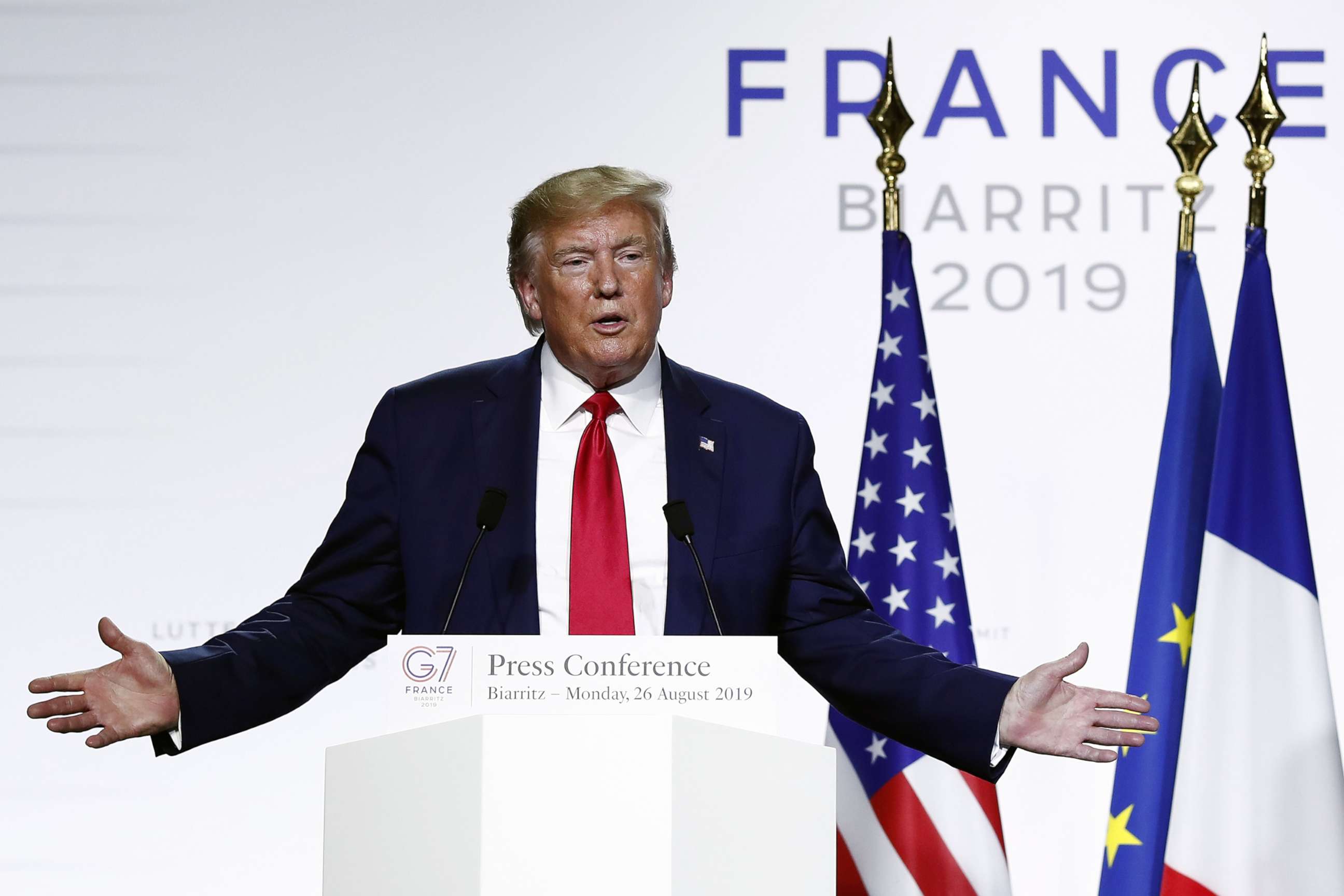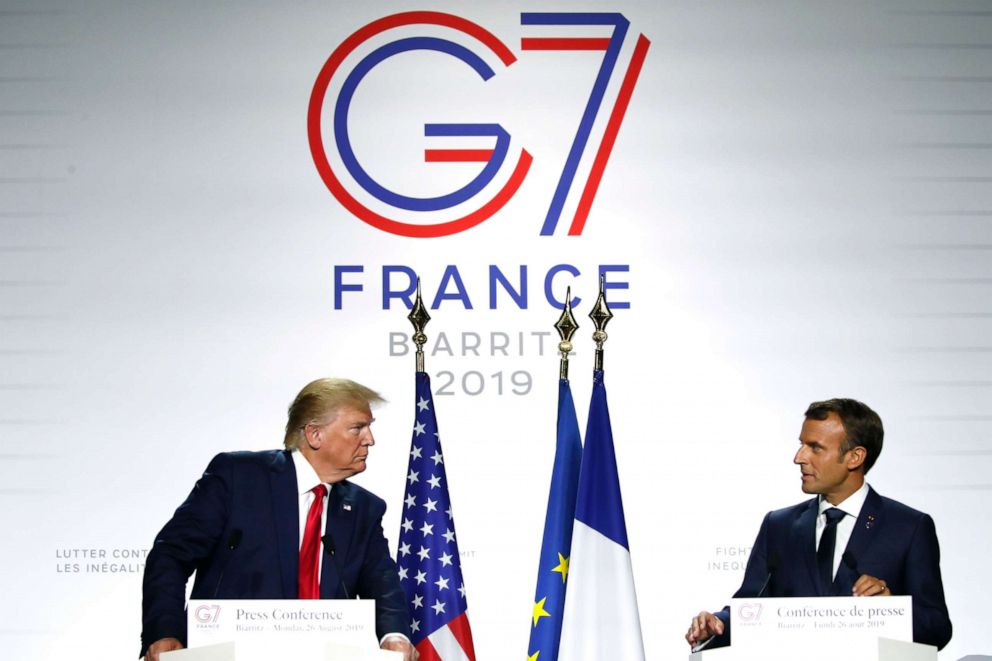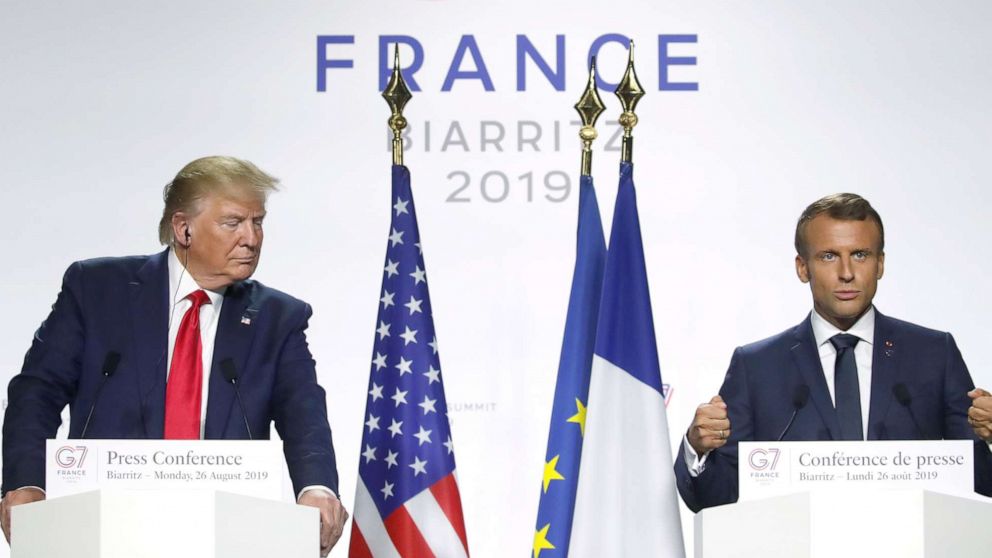Trump says 'great unity' at G-7 summit despite tensions over his trade war with China
President Donald Trump on Monday said there was "great unity" at the G-7 summit at a news conference he held with French President Emmanuel Macron at the conclusion of the annual meeting of world leaders.
Trump's characterization came after evident tensions at the summit over Trump's trade wars -- especially with China.

"Our deep wish is for an agreement between the United States and China," Macron said. "That would be positive for everyone."
His comments came after Trump earlier in the day struck an optimistic tone despite previously threatening a further increase in U.S. tariffs.
"They want to do a deal," Trump said of China at the news conference. "Very badly," he said..
Earlier, Trump, after sending a series of mixed signals about the status of U.S. trade negotiations with China over the course of G-7 summit, also struck an optimistic tone about the status of negotiations.
“I can say, we're having very meaningful talks. Much more meaningful than, I would say, at any time, frankly. I think for the most part, it's because we are doing very well,” the president told reporters on Monday.
“I think anything is possible,” Trump said when asked if it’s possible that a deal could be struck to delay or cancel the tariff increases he announced against China on Friday.

Calling it a “very positive development for the world,” Trump said that the Chinese called U.S. trade negotiators Sunday night and talks will resume "very shortly."
"China called last night our top trade people and said let's get back to the table, so we'll be getting back to the table," Trump said.
But confusion soon followed the president’s statement when China's foreign ministry spokesman said he was unaware of any weekend calls between the U.S. and China.
"I have not heard of the weekend calls mentioned by the U.S.," China's foreign ministry spokesman Geng Shuang said.
Soon thereafter, President Trump and Treasury Secretary Steven Mnuchin insisted there had been communications.
“We've had calls, we’ve had calls at the highest levels,” Trump said.
Treasury Secretary Mnuchin later added: “There were discussions that went back and forth. Let's just leave it at that.”
“Last night,” the president added. “And before last night. Numerous. But they want to something done.”
The president also pointed to a statement from China’s vice premier as evidence of shared optimism between the U.S. and China over the state of play.
"We are willing to resolve the issue through consultation and cooperation in a calm attitude and resolutely oppose the escalation of the trade war. We believe that the escalation of the trade war is not conducive to China, to the United States, and to the interests of the people of the world," Vice Premier Liu He said.
Trump interpreted the statement positively, telling reporters: “I think it's a very good word to use, calm. Not a word that I use that often. But it's a good word to use.”
President Trump’s latest comments were just the latest in series of whipsawing presidential signals about the raging trade war.
On Sunday, Trump said he was having “second thoughts” about his decision to escalate the trade war on Friday by announcing the U.S. would raise the tariffed rate on Chinese goods in retaliation to new Chinese tariffs.
"Yeah, sure," Trump said when asked if he had second thoughts about his escalating trade war with China. "I have second thoughts about everything."
But hours after making those comments, the White House argued that the president’s statement had been "misinterpreted.” White House press secretary Stephanie Grisham said in a statement that the only second thought the president was having was that “he regrets not raising the tariffs higher."
After he declared on Friday that he “hereby” was ordering U.S. businesses to stop doing business with China and look for alternatives for their supply chains, the president backed off his threat to declare a national emergency even as he maintained the right to do so.
"I have the right to. If I want, I could declare a national emergency," Trump said. "I think when they steal and take out intellectual property theft -- anywhere from $300 billion to $500 billion a year -- and when we have a total loss of almost a trillion dollars a year, for many years this has been going on. And in many ways that’s an emergency. I have no plans right now.
The president also returned to praising China's President Xi, calling him a “great leader,” after labeling him an "enemy" on Friday.
The president defended his fast-changing strategy with China, telling reporters "it's just the way I negotiate. It's done very well for me over the years and it's doing better for the country."
"I have people say, 'oh, just make a deal, make a deal.' They don't have the guts and they don't have the wisdom to know that you can't continue to go on where a country is taking $500 billion -- not million, $500 billion with a B out every single year," Trump said. "You just can't do that. Somebody had to do this."
While the president didn't show his cards on what his next move will be in the China trade war, he also didn't reveal whether he would retreat from his threat to put a tariff on French wine when a reporter observed that first lady Melania Trump had been spotted drinking a glass of wine during the weekend.
"I can confirm that the first lady loved your French wine. She loved your French wine. So thank you very much," Trump said.




